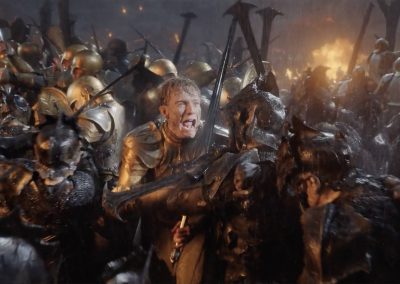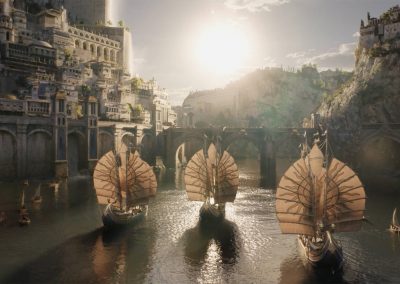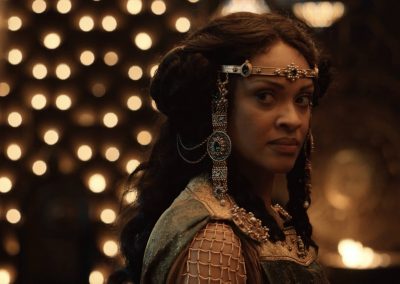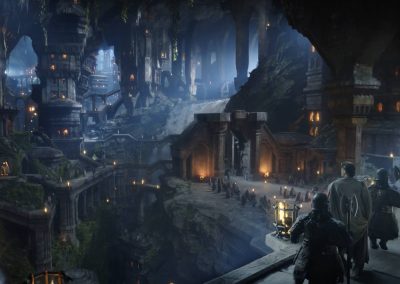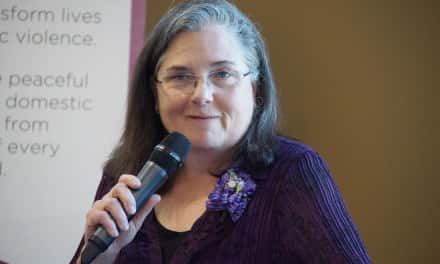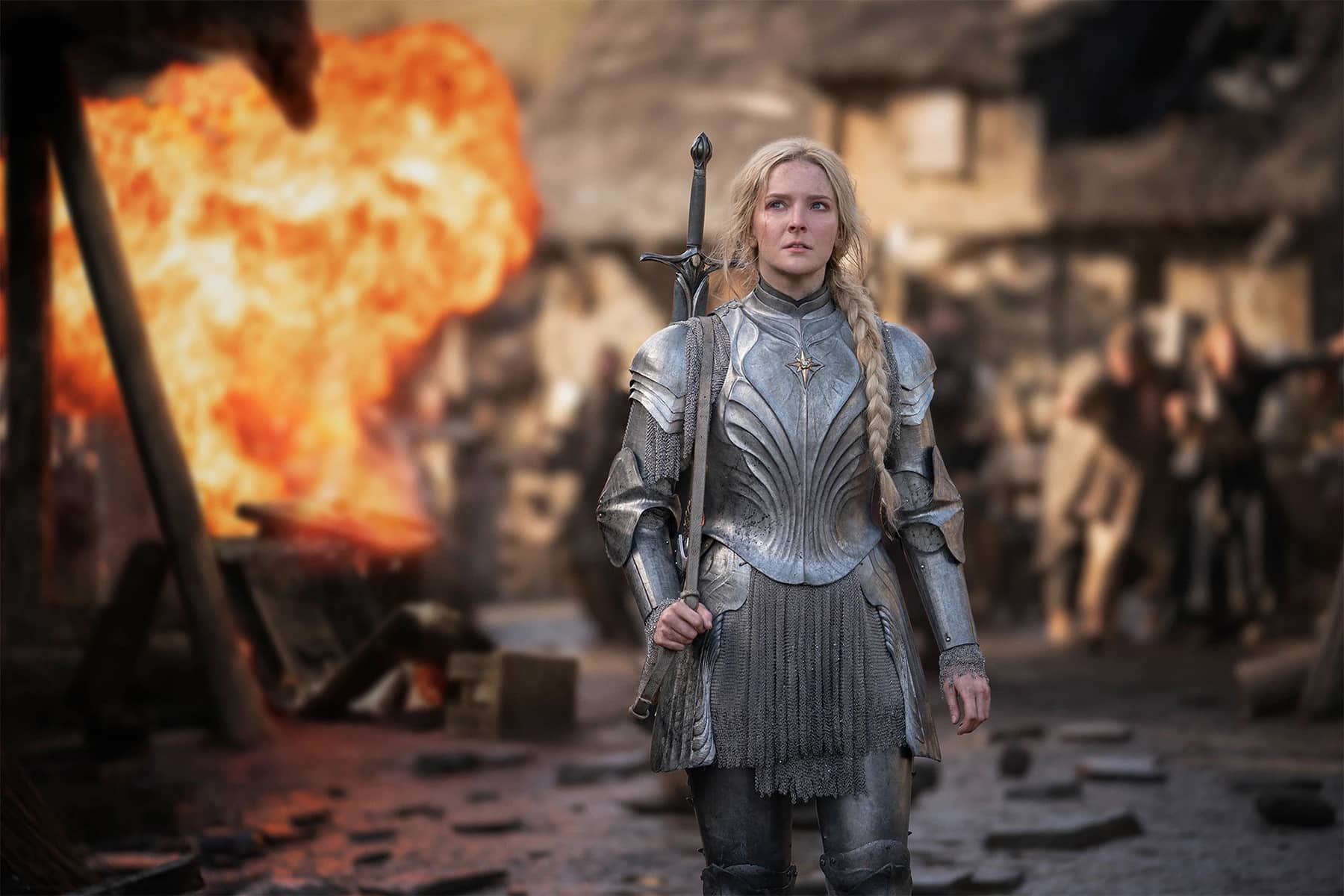
My relationship with childhood stories of fantasy has evolved over my lifetime, as the genre has also grown and matured into mainstream acceptance. Within the span of a couple weeks, two major fantasy franchises both launched on rival streaming services. After the first two episodes of each, it is clear that they could not be more different. They also reflect, perhaps unintentionally, major political and social narratives currently dominating America.
I grew up with the old Lord of the Rings cartoon movie from 1978, and other Hollywood attempts to present the realm of fantasy to a mass audiences. They were all awful, and reinforced the outcast stigma that had settled around players of Dungeons and Dragons.
For me, there was always an attraction to the mystical realms. Such amazing worlds tempted with the attraction of wizards and legends, in theory. But in the transition to theater screens, the reality was always spoiled by poorly designed creatures that spoiled any chance to be taken seriously. The idea of fantasy was powerful, but it was hard to embrace for casual participants, often demanding a hardcore commitment.
I remember after arriving in Japan I saw Peter Jackson’s The Lord of the Rings: The Fellowship of the Ring for the first time. I was absolutely drawn into it, and was emotionally moved almost to tears at a few points. It was a powerful drama I had not expected to witness in a fantasy film.
The experience inspired me to buy the LOTR books, eager to explore the world of Middle-earth in my imagination. But as soon as I started reading, my brain slammed to a halt. I remember being afraid to read Frank Herbert’s “Dune” for the first time. The names are easy to trip over and the style is a bit hard to digest. Such an epic tome can be intimidating to delve into. But once I began reading, I fell into the flow and rhythm of Herbert’s style.
For LOTR, I never felt I got a perch to begin my journey. That is not a reflection of the stories, but my own inability to digest the books. Perhaps J. R. R. Tolkien’s written word was too brilliant for me to comprehend. The names of people and places, trying to pronounce them in my mind made me dizzy.
I wish I had Stephen Colbert’s encyclopedic memory of Tolkien’s text. But I do respect and appreciate that so many people have such a deep fondness for the written work. How the Netflix’s series Stranger Things weaved D&D culture into the core of its multi-season storyline shows how popular the nostalgia for the fantasy game has become. It never seemed that cool in the 1980s, when the series takes place, but it is the heart of the show and its beloved characters.
Back in the 2000s, I continued with anxious anticipation as the next two LOTR movies were released, and felt a sadness when their story was finally concluded. The Lord of the Rings: The Return of the King was epic in loss and accomplishment, and left a deep emotional impact.
The 1978 cartoon movie was only part one of a two part set, and the second part was never produced. I always felt cheated by that, to be left hanging. There was no conclusion. The end was unreachable, because I did not read the books. So knowing what happened to the One Ring would forever remain elusive. Finally, thanks to Jackson’s stunningly crafted interpretation, I could find closure.
Along the way I learned that Marquette University had a significant collection of Tolkien’s original literary work. I was proud Milwaukee had a connection to the author, and fascinated by the idea of the collected manuscripts. But they were still words on paper, so my interest never stretched much further.
When “The Hobbit” trilogy was released, I found it entertaining but not inspiring in the same way as LOTR was. To some extent it was a disappointment, as it had been my hope to rekindle what I felt for the original trilogy. I remained a casual, if distant, consumer of fantasy stories. LOTR had set the bar really high for my expectations.
I remember hearing about the George R. R. Martin’s fantasy book series A Song of Ice and Fire, and how popular it was. But other fan favorite fantasy books had been adapted into movies, trying to capture some of the LOTR’s financial success. In my opinion the movies were poorly done, because the source material was equally flimsy. The stories were just LOTR clones, watered down with enough incoherent logic to avoid being sued for intellectual property theft.
I was still living overseas when Game of Thrones began broadcasting on HBO in 2011. I avoided watching it in the early years, after I returned to Milwaukee, because of my own culture shock. Processing the strange reality of home was more important than any fantasy story.
Over the years I did hear people talk about GOT, and saw it often referenced on other programs. It was a cultural phenomenon, and I was left out of it. Being gone so long, entire network programs came and went, and I could watch them in their entirety on Netflix. I grew up watching shows that would suddenly get cancelled, with no last episode to settle the story. Gilligan and crew would remain on their island forever.
I got into the habit of waiting for a series to end, which was not hard since I did not watch broadcast TV. Then I could view it in entirety at my own condensed pace – instead of having to wait week-to-week over years.
In 2017, GOT released its 7th season. It was announce that the 8th and final season would not be broadcast until 2019. So in December 2017 I figured it was time to see what everyone had been talking about since 2011. Apple iTunes offered a complete 7 season package to buy for a reasonable price, and I needed something to watch over the slow holiday news cycle. I purchased GOT sight unseen, with the hope that I had not made an expensive mistake.
I watched the first few episodes of GOT with distain, wondering why anyone liked it. But before long, I had to admit to being enthralled with it. I was hooked. I finished consuming all the seasons within a couple weeks, and then found myself with a long year to wait for the ending.
When 2019 came, I had planned to continue waiting until the 8th season was over and then watch it per my habit. But temptation was too much, and like everyone else I viewed GOT episodes weekly. I found the ending anti-climactic like most people, it had been rushed.
But all the major characters had been killed off over the years and the story kept circling the drain, so it really had nowhere else to go. I would have preferred more of the charm of the early seasons, with the intricate plots and characters. But all that had been discarded, so it ended where it ended.
I will never read the George R. R. Martin series, but I do think he has cheated his loyal fans by not finishing the books. He has had time to go on to write other stories. Which finally brings me to HBO’s House of the Dragon. I did not care one bit about it, and saw it as another attempt to cash in on fans, who were not abused enough at how Game of Thrones ended.
I admit that I watched all 8 seasons of GOT recently, while exercising on my treadmill. Looking at it in totality, I have a kinder view of the ending. I am not so emotionally attached to the story now and could view it from start to finish. Honestly, none of the seasons were very magical and the final episodes were in keeping with the overall story arc. The emotion of fans, stretched over time, made a big difference in perception.
As I started my autumn workout routine on my treadmill, I watched the first two episodes of House of the Dragon and the first two of The Lord of the Rings: The Rings of Power. They could not be more different. I did not think much about Dragon at first, but after seeing Rings I have a far different take.
When I heard that Amazon planned a Rings series, I was skeptical. When they announced the budget, my expectations even sank. Too many recent franchises shoveled out a ton of cash and were still big disappoints. They sought to reinvent themselves by jettisoning their beloved source material.
The story behind Prime Video’s The Lord of the Rings: The Rings of Power focuses on the legends of the fabled Second Age of Middle-earth’s history. Set thousands of years before the events of The Hobbit and The Lord of the Rings books, it explores an era when great powers were forged, kingdoms rose to glory and fell to ruin, unlikely heroes were tested, hope hung by the finest of threads, and one of the greatest villains that ever flowed from Tolkien’s pen threatened to cover all the world in darkness.
As I have outlined, I am not a super fanboy of fantasy, or either of these franchises. I have enjoyed and appreciated both, and taken issue with some things in the realms of each. But the emotional drama of Peter Jackson’s trilogy could be found in a quote by Galadriel’s brother in the first episode of The Rings of Power.
“Do you know why a ship floats and a stone cannot? Because the stone sees only downward. The darkness of the water is vast and irresistible. The ship feels the darkness as well, striving moment by moment to master her and pull her under. But the ship has a secret. For unlike the stone, her gaze is not downward but up. Fixed upon the light that guides her, whispering of grander things than darkness ever knew.” – Finrod
When Morgoth later engulfs the land of Valinor in darkness, the elves travel across the Sundering Seas to Middle-earth and fight back. Galadriel goes on later in life to track down Morgoth’s successor, Sauron.
With only the first two episodes to judge, Rings clearly establishes itself as an epic quest with strong characters who I care about. They are striving to reach something bigger than themselves, to help others. To save their shared world. The story has a gripping plot that weaves a rich lore into the journey.
By contrast, sadly, House of the Dragon is merely a re-hashed GOT. It is a manufactured soap opera of petty squabbling, as jealous brother seeks to usurp brother. The first two episodes were filled with political scheming, unnecessary graphic violence for the sake of shock, and a few gratuities sex scenes. I know it is a prequel to GOT so it cannot stray too far in creativity. But clearly, that is all the series is about. Backstabbing for control of the throne.
When I look back at GOT I see one character – Cersei Lannister, as the architect of the story’s delusion. She sabotages her family at every step until she becomes queen, then lets her kingdom burn in dragon fire simply to hold onto the throne for another day. Her motivated was to provide a lasting legacy for her children, who were all killed off at every turn by her schemes. So, what was the point of any of her machinations, if House Lannister died with her?
GOT made for a good fantasy soap opera leading up to the Trump years, with its feudalistic narrative. Dragon is a weaker recycle of that story, much in the same way that attention is focused on 2024 as a comeback year for a twice impeached former president who planned a coup and incited an insurrection to retain power.
I make no political comparisons for Rings other than it recognizes darkness in the world, and the need to fight for the light. Perhaps these themes are why there has been so much backlash from a toxic “fanbase.” Upon hearing that Rings had cast Black actors, it seemed expected that there would be a right-wing backlash. But a diverse cast is secondary to the powerful theme of the series, striving to protect good.
In this context, I feel really insulted by the plot of Dragon. It just serves more poisonous characters, who there is no reason to care about.
Based on the book Fire & Blood, one of the early scenes in the HBO premiere episode illustrates my bewilderment of both the writers and the viewing audience. Martin’s depiction in the book has the Targaryen queen die in childbirth, but in an unspecified manner.
I found the interpretation of that scene in the show absolutely disturbing. It was presented with needless graphic violence. Because the baby was in breach, it threatened the lives of both child and mother. So it was decided, without even asking the queen, to preform a c-section. In the context of the story, a cesarean procedure existed as little more than theory.
What followed was visceral and needlessly horrific montage, as her belly was savagely sliced open in a grotesque medieval fashion. Such a barbaric childbirth scene was absolutely unnecessary.
LOTR as a story was very much an extension of Tolkien’s life experiences. When Faramir commanded a doomed calvary charge on Osgilliath in The Lord of the Rings – The Return of the King, I always think about World War I. Tolkien faced the brutality of trench warfare, and the Middle-earth setting was where he shared his real life grief.
With the production of these two news series, I do not believe that most of the political connections were intentional. Like any art or story, they are a reflection of the time, experiences, and environment of the writers. Such things can color source material, which itself was likely created under similar conditions.
At their core, LORT and GOT are very different stories. Being fantasy tales that include dragons is about all they share. GOT was always about brutality, whereas LOTR was about redemption and the hope for justice against an overwhelming evil. It sought to lift all the characters, not consume them by an internal rot.
I am unsure if I will continue to watch Dragon in this light. Perhaps in the future. I do not begrudge anyone from watching or liking it. There is all kinds of entertainment for all kinds of tastes. What we like changes over time. We view movies, that we grew up with and loved, with adult eyes. We then realize just how terrible they were. We experience these dramas at different times in our lives, and have different reactions because we change – not the drama.
But often as I view older movies, I look at them as a sociological record. What was happening when the film came out, what were the social trends and problems of that day. Movies often say a lot about what is going on in American society, without them being political films.
After being exposed to so much social unrest from the past few years, I look for whatever brief moment I can to find refuge in a good story. I thought Dragon might offer that, until the light of Rings showed me just how much darkness it held.
I have often heard people say, “it is what it is” in reference to terrible situations we must accept. I still contend that the world is what we make of it. If it is terrible, then we have made it so. Our arts, and our leaders, are all a reflection of who we are. There will always be terrible in the world, but must we make it so in order to profit? At the heart of our society, money – and the lack of it – always shows what we truly value.
- Sociology of Evil: Why Ukraine’s new language of war uses Tolkien’s metaphor to express Russian brutality
- A non-White fantasy world: Why Tolkien’s “The Rings of Power” is no less authentic with a cast of Black actors
- Exhibit of J.R.R. Tolkien’s manuscripts for “The Hobbit” and “The Lord of the Rings” coming to Milwaukee
- Manuscripts and art from Marquette’s J.R.R. Tolkien collection on loan for national exhibit in France
- Fans worldwide toast J.R.R. Tolkien on his twelfty-seventh birthday
- Rare edition of Tolkien’s The Hobbit acquired by Marquette University
- Tolkien & Lewis film explores myth, truth, and the meaning of life
- George RR Martin offers a vacation from “Fire & Blood” news headlines with fantasy novel
Mаtt Grаcе / Prime Video and Amazon Studios

